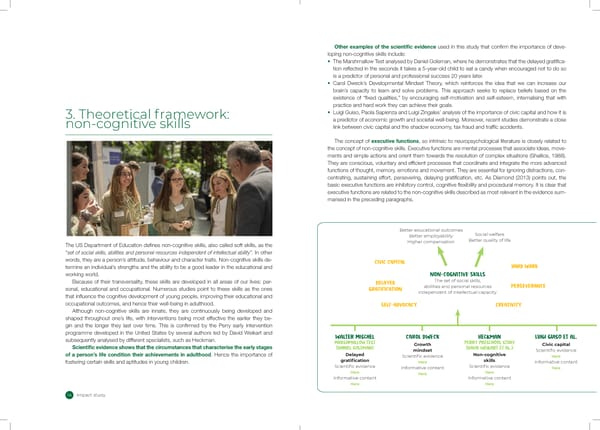Other examples of the scienti c evidence used in this study that con rm the importance of deve- loping non-cognitive skills include: • The Marshmallow Test analysed by Daniel Goleman, where he demonstrates that the delayed grati ca- tion re ected in the seconds it takes a 5-year-old child to eat a candy when encouraged not to do so is a predictor of personal and professional success 20 years later. • Carol Dweck’s Developmental Mindset Theory, which reinforces the idea that we can increase our brain’s capacity to learn and solve problems. This approach seeks to replace beliefs based on the existence of “ xed qualities,” by encouraging self-motivation and self-esteem, internalising that with practice and hard work they can achieve their goals. ׁ. Theoretical framework: • Luigi Guiso, Paola Sapienza and Luigi Zingales’ analysis of the importance of civic capital and how it is non-cognitive skills a predictor of economic growth and societal well-being. Moreover, recent studies demonstrate a close link between civic capital and the shadow economy, tax fraud and traf c accidents. executive functions, so intrinsic to neuropsychological literature is closely related to The concept of the concept of non-cognitive skills. Executive functions are mental processes that associate ideas, move- ments and simple actions and orient them towards the resolution of complex situations (Shallice, 1988). They are conscious, voluntary and ef cient processes that coordinate and integrate the more advanced functions of thought, memory, emotions and movement. They are essential for ignoring distractions, con- centrating, sustaining effort, persevering, delaying grati cation, etc. As Diamond (2013) points out, the basic executive functions are inhibitory control, cognitive exibility and procedural memory. It is clear that executive functions are related to the non-cognitive skills described as most relevant in the evidence sum- marised in the preceding paragraphs. Better educational outcomes Better employability Social welfare Higher compensation Better quality of life The US Department of Education de nes non-cognitive skills, also called soft skills, as the “set of social skills, abilities and personal resources independent of intellectual ability”. In other words, they are a person’s attitude, behaviour and character traits. Non-cognitive skills de- CIVIC CAPITAL termine an individual’s strengths and the ability to be a good leader in the educational and HARD WORK working world. NON-COGNITIVE SKILLS Because of their transversality, these skills are developed in all areas of our lives: per- DELAYED The set of social skills, sonal, educational and occupational. Numerous studies point to these skills as the ones GRATIFICATION abilities and personal resources PERSEVERANCE that in uence the cognitive development of young people, improving their educational and independent of intellectual capacity. occupational outcomes, and hence their well-being in adulthood. SELF-ADVOCACY CREATIVITY Although non-cognitive skills are innate, they are continuously being developed and shaped throughout one’s life, with interventions being most effective the earlier they be- gin and the longer they last over time. This is con rmed by the Perry early intervention programme developed in the United States by several authors led by David Weikart and Walter Mischel CAROL DWECK Heckman Luigi Guiso et al. subsequently analysed by different specialists, such as Heckman. Marshmallow test Growth Perry preschool study Civic capital Scienti c evidence shows that the circumstances that characterise the early stages (Daniel Goleman) mindset (David Weikart et al.) Scientific evidence of a person’s life condition their achievements in adulthood. Hence the importance of Delayed Scientific evidence Non-cognitive Here fostering certain skills and aptitudes in young children. gratification Here skills Informative content Scientific evidence Informative content Scientific evidence Here Here Here Here Informative content Informative content Here Here 14 Impact study
 Junior Achievement Foundation Page 7 Page 9
Junior Achievement Foundation Page 7 Page 9